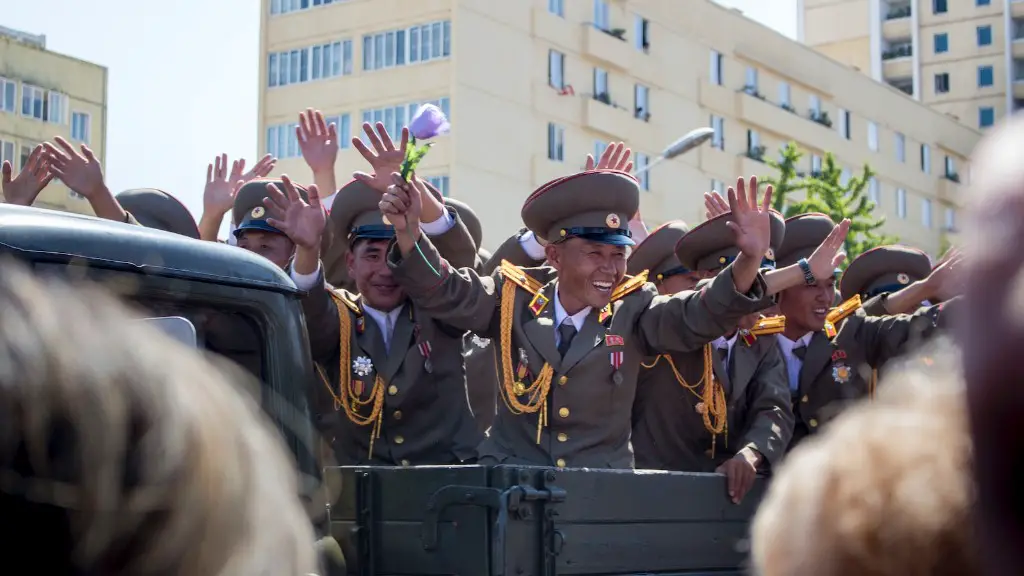The United States and North Korea are two countries that in recent months have kept the world on its toes with the prospects of a potential war between the two nations. Hundreds of millions of people across the world have watched the tension between these two countries, wondering if the sabre rattling will lead to a conflict, or if the two sides can find a peaceful resolution.
It has become clear that North Korea’s nuclear and ballistic missile programs are the major topics of discussion. The United States stated that it will not allow North Korea to have the capabilities of striking America with nuclear weapons, and warranted economic and military retaliation if such weapons are developed. On the other hand, North Korea has continuously stated that it will not give up its nuclear program, seeing it as integral to their security.
The stakes involved in a potential US-North Korea conflict are high and the consequences could be devastating. Experts say that if a war were to break out, North Korea could potentially launch nuclear weapons, causing possibly millions of casualties and huge destruction. Economists predict that world markets would crash if war were to erupt, as the disruption in trade would be massive.
On the political side of things, the US would face significant opposition from countries such as South Korea, China, and Russia. These countries would not want to see a conflict on the Korean Peninsula, let alone a potential nuclear conflict. On the other hand, the US has been putting immense pressure on North Korea, imposing stringent economic sanctions.
With the situation at such a heightened state, diplomacy and the use of diplomacy appears to be the only way to avoid a war. The US and North Korea have so far been unable to come to any diplomatic solution, however, the recent summits between North Korean leader Kim Jong Un and US President Trump show that some progress has been made towards diplomacy.
President Trump has stressed the importance of China and other neighboring countries in helping to bring North Korea to the bargaining table. China, Japan, and South Korea face a huge potential humanitarian crisis if war were to break out, and so have become mediators in helping to bring peace to the Korean Peninsula.
For the moment, the situation appears to have reached a stalemate. It remains to be seen whether the United States and North Korea can find a peaceful resolution to the situation, but for now, the outlook appears bleak.
Impact of Nuclear War
In the event of a nuclear war, the consequences would be immense. Scientists say that the blasts from the bombs would cause immense destruction, and that the mortars would cause fires and deadly radiation. The level of destruction caused would be extremely difficult to predict.
According to the International Physicians for the Prevention of Nuclear War (IPPNW), the potential devastating impact of a nuclear war would include “temperature changes, depletion of the protective ozone layer, massive disruption of rainfall and agricultural cycles, disruption of human health and mortality on a large scale, and disruption of global economic, political, and social systems”.
Not only would the immediate effects of a potential nuclear war be catastrophic, but the long-term impacts would be just as damaging, if not more so. The Nuclear Threat Initiative warns that in the case of a nuclear conflict, it is possible for the “radioactive fallout to drift for weeks and contaminate vast areas, causing long-term health problems and deaths”. Additionally, the economic, political and social toll of nuclear war could take decades to repair.
Challenges to Peaceful Resolution
One of the major challenges to a peaceful resolution is the fact that both the United States and North Korea have different objectives and interests. The United States is looking to denuclearize the Korean Peninsula, while North Korea is looking for security guarantees for its regime. As such, the two sides are not necessarily able to come together and easily agree on a resolution.
Another challenge is the domestic political dynamics at work in both countries. In North Korea, Kim Jong Un is seen as a strong leader who is unlikely to back down from US demands. Similarly, in the United States, President Trump has faced much criticism from opponents at home who do not support his approach to dealing with North Korea.
The international community can also serve as a major obstacle for peace. Countries such as China and Russia, while encouraging a peaceful solution, have also been quick to blame the United States for the tension. As such, it is not easy for the United States to trust these countries to be honest brokers in negotiations.
Global Reactions
The possibility of a US-North Korea war has triggered reactions around the world. Countries such as Japan and South Korea, two of the closest US allies, have turned to the United States for protection should a war break out. The United Nations has also spoken out against the rising tensions, condemning North Korea’s nuclear and ballistic missile tests as violations of international law, while also calling on both countries to exercise restraint and pursue peaceful approaches to the situation.
At the same time, China and Russia have sought to use the crisis to their advantage. China in particular has been advocating for a gradual diplomatic solution to the current impasse, opting to take a much softer stance than the United States.
Position of the US
The position of the United States is a complex matter, as the US has taken a hard-line stance on North Korea’s nuclear program. The US has established a policy of ‘maximum pressure’ against North Korea, and has sought to isolate the rogue state with economic sanctions and other measures.
The US has made its position clear, stating that it will not accept North Korea as a nuclear power, and will not accept a nuclear armed North Korea. The US has also rejected North Korea’s insistence that the United States must provide security guarantees before the country will denuclearize. It remains to be seen if the US will back down from its stance and allow North Korea to keep its nuclear weapons, or if diplomatic efforts will be successful in moving the two countries towards a peaceful resolution.
Effect On Other Countries
The potential conflict between the United States and North Korea has had significant effects on other countries in the region. In particular, China, Japan and South Korea have been the most affected. China in particular has had to balance the needs of the US and North Korea, as the country seeks to maintain its strategic interests in the region.
Japan and South Korea have had to take steps to ensure that the situation does not reach a point of no return. Both countries have sought to pursue diplomatic channels to reduce tensions, while also strengthening their own defenses against the possibility of a US-North Korea conflict.
Possibility of War
At this moment in time, it appears that the chances of a US-North Korea war are slim. Given the consequences of such a conflict, it is unlikely that either side would be willing to risk such a devastating prospect.
That being said, the situation remains fluid, and the United States has consistently called for an end to North Korea’s nuclear program. Should North Korea continue to defy the US and international law, the chances of a conflict could increase significantly.

